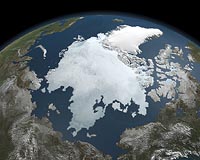| . |  |
. |
Moscow (AFP) May 5, 2011 Russia launched an urgent rescue mission on Thursday after one of its atomic-powered icebreakers developed a nuclear leak in the frozen seas of the Arctic and was forced to abandon its mission. The Rosatomflot nuclear fleet said in a statement that an "insignificant increase in activity" had been detected on board its 21,000-tonne Taimyr icebreaker. But the incident was serious enough to force the vessel to abandon its mission and begin a five-day journey back to its home port in the northwestern city of Murmansk. The agency also announced plans to shut down the reactor before the ship enters into port -- a reversal of an initial statement saying that decision would only be reached if the situation got out of hand. Officials stressed that their most immediate worry concerned the 23-year-old vessel's ability to navigate the rough icy sea of the Arctic. "What we are most concerned about right now is movement along the waterways," the state-run RIA Novosti news agency quoted top Rosatomflot official Andrei Smirnov as saying. The fleet official said another icebreaker was being dispatched to the region to help the Taimyr's journey back to port. But it was not clear how far it remained from the stricken craft. The incident was reported in the Kara Sea -- a part of the Arctic Ocean about 2,000 kilometres (1,300 miles) east of Norway's border. The Taimyr has a single 171-megawatt reactor that generates about one-third the energy of the Fukushima 1 reactor that suffered in the Japanese earthquake and tsunami disaster in March. Rosatomflot said the increased levels of radiation were first detected in the air ventilation system surrounding the icebreaker's power unit and that subsequent check showed no further damage. It attributed the higher readings to "a leak in the primary coolant system". But most other details -- including how many people were on board the ship -- remained sketchy. The agency initially said the ship's reactor would be shut down "if the situation deteriorates". But a second statement issued about 10 hours later the nuclear power generator would be shut before the icebreaker enters into port "to reduce the time frames needed to prepare for repairs". Rosatomflot stressed that the incident was still being registered as a zero on the seven-point International Nuclear and Radiological Event Scale -- a level officially defined as "bearing no safety significance". "The radiation parameters on all the open decks and indoor facilities of the icebreaker are at natural levels," Rosatomflot General Director Vyacheslav Rukshi said in a statement. The Arctic sea accident revived memories of the loss of the Kursk nuclear submarine after an accidental torpedo explosion that claimed the lives of 118 Russian sailors in August 2000. Russian officials were painfully slow to acknowledge the scale of that disaster and state television only began devoting full attention to it nearly 48 hours after the Kursk sank. The icebreaker's problems -- first reported by RIA Novosti in the morning -- did not make onto any of the afternoon or evening state television news programmes. Military analysts said the incident as described thus far -- while posing no serious environmental danger -- pointed to a serious disruption on normal operations. "Even a small radiation leak inside the reactor structure is a serious event," said independent military analyst Pavel Felgenhauer. "If the leak is small, they might be able to repair it. But it is hard to do because the reactor is hot," Felgenhauer noted. The Taimyr is one of two icebreakers built for the Soviet Union by Findland's Wartsila shipbuilder that are still operated by Russia. Its hull was constructed in Finland and the reactor installed in Russia. The US-based GlobalSecurity.org research organisation said the two Finnish ships were "originally designed for 100,000 hours of reactor life, but this was extended first to 150,000, then to 175,000."
Share This Article With Planet Earth
Related Links Beyond the Ice Age
 Record Arctic warming to boost sea level rise
Record Arctic warming to boost sea level riseOslo (AFP) May 3, 2011 Record warming in the Arctic over the past six years will substantially contribute to a global sea level rise of up to 1.6 meters by 2100, according to a study published in Oslo Tuesday. "Surface air temperatures in the Arctic since 2005 have been higher than for any five-year period since measurements began around 1880," the Arctic Monitoring and Assessment Programme (AMAP) said. "In th ... read more |
|
| The content herein, unless otherwise known to be public domain, are Copyright 1995-2010 - SpaceDaily. AFP and UPI Wire Stories are copyright Agence France-Presse and United Press International. ESA Portal Reports are copyright European Space Agency. All NASA sourced material is public domain. Additional copyrights may apply in whole or part to other bona fide parties. Advertising does not imply endorsement,agreement or approval of any opinions, statements or information provided by SpaceDaily on any Web page published or hosted by SpaceDaily. Privacy Statement |